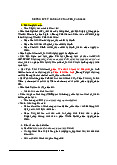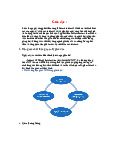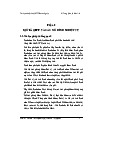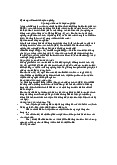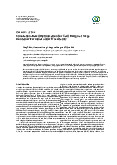











Preview text:
.
Fantasy short stories are a genre of fiction
that usually takes place in an imaginary world
filled with magic, mythical creatures, and supernatural events
Fantasy stories will often feature:
Adventure, with the main character(s) going on a quest or being chosen to complete a special task. Mystery Magic Mythical creatures
A portal between reality to another world
Dramatic settings (castles, mountains, forest) Length: 2200
About this fantasy short story: He was born a fisherman
and he will die a fisherman, but he is also deathly afraid of the
ocean. Here, on the islands, where you can only ever be what
you were born to be, how can you escape a world you can
longer stand to live within? The answer, and resolution to this
most unusual of fantasy short stories, is simple when you think
about it: you take desperate and dangerous steps.
How do you make progress in a world that doesn’t change? You
don’t. Every now and then, though, I catch myself thinking about
what my life would be like in a different world; one where
progress hasn’t been declared an enemy of the people and
locked away out of sight and — most people’s — minds. A world where I could change.
I am a terrible fisherman. I know this, my father knew this, everyone knows
this. I don’t like water, I get seasick and I’m impatient. My market
stall always has the thinnest offerings — unless the water had
been uncharacteristically calm that day. Yet I am a fisherman by
trade and will be one until the day I die. That’s what it’s like on
the islands, where you are no more than what you were born to be.
Even the royals have no say in the matter.
For as long as we have known, a single family has ruled the
people of our secluded, water-locked nation. Brother marries
sister to keep the bloodline pure, and their offspring do the very
same. There is, and has only ever been, one royal family; nobody
new ever takes power. Nothing ever changes. Their only threat is
the randomness of nature. A brother and sister have been known
to produce only male or female heirs, which is a problem.
Famously, a King and Queen of two-centuries past had eight
sons. Their sons then had to be tasked with fathering a pair of
siblings; a new King and Queen capable of carrying on the family
line. A difficult task without a sister.
It was a worrisome time for our people, but with the help of aunts
and nieces, the reign of the family continued. Insurance policies
are always in place, of course; extra sons, daughters and cousins
standing by to take up the mantle, should the current monarchs
die or prove baron. It’s all the same blood, after all.
It may sound strange, but the system works. We are an affluent
nation. A nation of stability. A stability that comes from a
foundation of knowing that we all have a part to play; that we all
have our jobs to do. If we were to change that, if we were to
inspire progress, that foundation would be ripped from beneath
our feet, and we’d end up like the unstable nations ruled by an
ever-changing roster of royals and military leaders on the mainland.
At least that is what the royals claim.
So when I was born to a fisherman, I was to be a fisherman. To
take his place when he retired. To keep the wheel turning without
ever going faster. While I’m not an only child, my brother could
never take over from me. The older child takes the father’s
profession, the younger the mother’s. No trades; no exceptions. If
a child dies, you have another to replace them. You must have
two children - replacements - but you must never have more
than that. One child for one parent.
Sadly, my family briefly had three children. My mother fell
pregnant by accident. They prayed and prayed that the baby
would be needed elsewhere. Sometimes a mother or father will
die, then their offspring will die before they can carry on the
family profession and keep the economy in its fixed position.
Other times, a man or women will not marry, and have no heir.
While most are required to marry and sire by law, as the Gods
would have it, there is not always a man for every woman.
So, those women pregnant with a third can offer the child as a
replacement for whatever role is unfilled. But when my mother
gave birth, there was an abundance of third children and an
island of good health. My late sister was drowned before she
turned one day old. The grief killed my father and since then I’ve
filled his place within the world; replacing him in all that he was.
Nobody is unique on the island, we all follow the same path as
the one before us, and we all will be followed by a copy of ourselves.
People from beyond our island find this practice very unusual.
Not least because women can be warriors while men can be
childcarers. In the customs of the mainland, men and women
have very specific roles to play. On the islands, anyone can and
will be anything, just as long as their mother or father was that
before them. They also think it strange our royals marry their
own blood. They seem disgusted by the notion. It makes sense to
most on the island, those who are happy without progress. And
most are that, happy. People have work, people have money, and
people have purpose. We stay safe, we stay stable and we don’t
go hungry. Visitors say we live on a knife edge, that one day it
could all crumble. What if one man breaks rank; one ruler sees a new path?
They’re right, of course, which is why they aren’t allowed to visit
often, and why nobody is allowed to break rank. Visitors are not
only rare, but are never allowed to stay. We don’t take
newcomers to the island. To live here you must be born here.
New additions would require new work, new lands, new wives or
husbands. That would mean change.
But I had to move forward. I had to.
While others celebrated the life of their ruling class and scoffed
at the foreigners for their unusual and seemingly reckless
economic and social practices, I yearned to be part of their world.
I hated what I did, yet I was trapped without hope nor chance of
escape. For anything close to that, I’d need a wife, then a child,
then old age. But none of that was on the horizon. The only thing
that was on the horizon was the sight of fellow fishing boats as I
bobbed across the warm waters, my head spinning, my stomach
churning and a pool of vomit slowly floating away from my little
one-man wooden vessel. Although I hated my little boat, I did
sometimes consider it my last resort — I could just sail away. The
punishment for abandoning you duties was worse than you might
think, though. All my remaining family would be slaughtered, the
gaps left behind would be filled by the servers, a group of people
whose profession it was to fill in for those that couldn’t work, be
they ill, jailed, injured or dead, until a new draft of newborns
could be trained and succeed our roles. There was no way to
avoid your service to the island, not unless you wanted to pay a
terrible price. Faking your death or getting ‘lost at sea’ was no
promise of mercy from the royals either, and our current rulers,
benevolent as they claimed to be, were more than ruthless
enough to hang a family on unprovable charges.
Tormenting citizens was the only interesting thing they ever got to do.
I was doomed to a life I loathed in a world not meant for me, but
then, as I floated along, trying to keep the contents of my
stomach very much within my stomach, I was struck with an
idea. For the first time in my life, I felt like I’d made progress.
My dream, since I was a boy, was to develop some form of magic.
Most of those blessed, or cursed as islanders would say, were
born with their gifts, yet on that rare occasion, some found it
caught them later in life. Magic on the islands was seen as a
dangerous thing. A force for change — a challenge to the ruling
class. A threat to our fragile existence. An enemy that must be eliminated.
Those with magic were not killed like the unwanted children,
however. Our rulers were too God fearing for that. But, they
couldn’t stay here. Magic wielders were shipped to capitals cities
on the mainland, places where they were worshipped, not
shunned. It was the only way off the island — that or to be an
unwanted royal. Too many royals meant a need for more wealth
in the monarchy, which meant a shift of wealth distribution
across the whole island, which meant change. But you couldn’t
kill a royal either. Their blood may be needed. To save on costs,
those on the furthest edges of the family were sent overseas too,
although they didn’t enjoy the same warm welcome as the magic wielders.
Yet I was not blessed with either royal or magic blood.
Magic was rare, very rare, and those that did possess it had very
obvious gifts. You’d find either element-wielders, those that could
conjure flames from mid-air or ice from stone, or see-ers,
individuals granted visions of the future or distant lands. Both
types of magic were easy to test and recognise, and seemingly
impossible to fake. Or were they? Of course, there was no way I
could feign a jet of fire spitting out of my fingertips, but, as my
mind wandered over the horizon, letting more and more fish slip
through my net, I wondered if I could work a plot cunning enough
to appear as if I’d made a prophecy come to bare.
To me, it was all simple enough. So simple I spent days scolding
myself for not thinking of it sooner. One happy result of being
stranded at sea most of the day, with a desire to focus on
anything other than the choppy waves, was that I had found
methods of distracting my mind. Unlike many of my kin, I’d
taught myself to read. When you were unable to stand for fear of
falling over in a fit of dizziness and nausea, remaining clamped in
the corner of your boat with a book was the most appealing
option you had. As it turned out, reading was a powerful ally in
the world of scheming. I could access knowledge that so few
others knew existed. Our library was small but full of history,
including plenty of scrolls and even the occasional book on two
subjects I found most interesting: magical occurrences, and poisons.
The greatest prophecies, the ones that never failed to get the
see-ers of the island banished, were always tragic in their end
result. Death was a recurring theme, but should I claim to foresee
the death of my neighbour and they turn up with a knife in their
neck, suspicion might just overcome the royal’s fear of magic. I
had to be more subtle — and poison, I had discovered, was the
most subtle killer of all. I’d read all about the vilest and vicious of
poisons. Poisons that could kill with just a drop. Poisons that
could kill without a sound or symptom. I had to face a very serious question though: Was I a killer?
The answer, sadly, was an overwhelming cacophony of no’s
echoing inside my mind. I was desperate to leave my life behind,
just not at the cost of another. But poison did not always have to
kill people. Livestock was just as vulnerable, as were crops and
food stores. But the whole thing had to be dramatic. It had to get
people’s attention if I were to bewitch the public, inspire hearsay
and convince the royals I was a danger to their world. Happily, a
few scrolls existed on the art of acting, left behind by a very learned old theatre performer.
So what did the scrolls say I needed for a good performance? A
crowd. I chose my location wisely. A bustling market by the
water’s edge during a warm summer’s day. People were out in
droves. Then I had to make it believable. Candid recounts in the
books and scrolls I’d read spoke of how see-ers gripped by
powerful foresight would collapse into a heap, muttering
inaudible words and contorting their bodies. Finally, I had to
follow through. I had to carry on the performance to reel in my
audience. The true see-ers would wake in a daze and utter words
of prophecy, before becoming unnervingly energised and without
recollection of the moments prior, instead, slowly coming to
remember their vision over the next few minutes. And so, after a
multitude of practices hidden away at home in the dead of night, I began.
A plague was coming, a monstrous plague, I believe my exact
words were, before I snapped back to life. It’s hard to know if I
did a good job, but those crowding around me seemed alarmed
and fearful, which I took to mean that I had followed the old
performer’s words well enough.
The acting was the hard part, making the prophecy come to
fruition was far easier. Mashing up the glands of poisonous fish
and mixing them weeds for added potency was challenging, not
least because of the smell, but far less taxing than being a live
performer. I concocted a deadly liquid to spread across the lower
farmlands in the dead of night. By morning, the crops wilted and
began to rot, the poison soaking into their roots and decimating everything it touched.
I was quite surprised by its effectiveness.
Not an hour after sunrise I was taken, strung by the wrists and
spread across a wooden wrack, set before the royals. And with
that, I achieved what nobody on the island had done for
centuries. I progressed. I worked my way out of a hole I could not
bare to exist within, and I was free.
I am a terrible fisherman. Yet I am a fisherman by trade and will be one until the day I die. Even
the royals have no say in the matter. For as long as we have known, a single family
has ruled the people of our secluded, water-locked nation.
Brother marries sister to keep the bloodline pure, and their offspring do the very
same. A difficult task without a sister. It was a worrisome time for our people, but with
the help of aunts and nieces, the reign of the family continued. If we were to change
